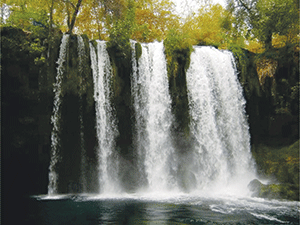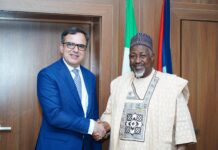Cross River leads the pack
The burden to change the financial fortunes of Nigeria and create jobs does not rest on the shoulders of the federal government alone. Some states have made efforts to harness and stimulate the tourism potential to better the lives of their residents.
Worthy of note are the sterling contributions of the two Governors of Cross River State in the past 16 years, Donald Duke and Senator Liyel Imoke.
 They turned Cross River from obscurity into a foremost tourism destination in Nigeria and Africa, truly deserving the nickname as Africa’s warmest welcome state.
They turned Cross River from obscurity into a foremost tourism destination in Nigeria and Africa, truly deserving the nickname as Africa’s warmest welcome state.
Infrastructure at the famous Obudu Ranch were upgraded and tourist centres, including the Calabar Marina Resort, Tinapa Business and Resort, were developed among others.
To attract visitors to the state, the Carnival Calabar was introduced at the turn of the millennium in 2000. The Yakkur trade cultural extravaganza, Leboku, and the Obudu Mountain International Race were established in 2005.
Imo and $500m pipe dream
In 2011, Imo State Governor, Rochas Okorocha, earmarked $500 million to convert the Oguta Blue Lake into a movie village amid fanfare with newsmen and Nollywood actors. He also promised to relocate the Ministry of Culture and Tourism to Oguta.
The project remains only on paper, after some billions of naira has been spent.
Ekiti’s success with Ikogosi
The redeveloped Ikogosi Warm Springs Resort, Ikogosi, Ekiti State by former Governor Kayode Fayemi is one of tourism’s success stories in Nigeria today.
The warm springs, where nature and modernity have a perfect blend and a bubble in the new life that has been injected into it, has transformed the once moribund spring to a world class standard tourist centre.
Appreciable steps taken by Lagos
Lagos State, with the highest potential for tourism development, remains enormously untapped. Yet in the past 16 years, the state has taken appreciable steps to transform infrastructure, the basis for a sustained, profitable tourism development.
Former Governor Babatunde Fashola said during a tour of the reconstructed Apapa Amusement Park that “the intention is to fall back to what was already in existence. And now, the old Amusement Park in Apapa is coming back to life.
“So we can now go to Iddo Park, Lekki Park or Alimosho Park or Amuwo-Odofin Park or even Ajegunle Park to demonstrate that we can fix things.
“Somebody told me this place looks like Dubai and I told him that there is no mystery to it, if people work hard we can build anything we want in this country and the money, we can find, because the market is here.
“This is a very strong statement of our commitment to tourism. A lot of work is currently going on in Badagry at the Beachfront; reclamations at the Slave Port, the rail and the expansion of the Lagos-Badagry Expressway are all drivers of tourism.
“If there is no transportation, there will be no tourism. Tourism is all about destinations, how quickly you can get there.
“That is what the rail and the road expansion in Badagry will do. That is what the about 15 or 16 road contracts we awarded in Apapa are doing.”
Disun Holloway, former Lagos State Commissioner for Tourism and Intergovernmental Relations, recounted that “tourism activities fell from 75 per cent to 36 per cent for a period of four months in 2014 that the Ebola virus disease lasted, and it really affected the turnover of the hotels.
“The big hotels lost about N8 billion within this period.
“The tourism industry contributed N46 billion per annum, less than one per cent to the state’s budget, but tourism in the state will be given a boost to make between 15 and 20 per cent of Lagos budget once the state’s critical infrastructure is adequately developed.
“Our economy is large. For us to contribute 15 to 20 per cent, tourism needs to be large.”
While the laudable efforts of Lagos are commended, the state needs to put more strength and grit into packaging and promoting core tourism activities.
The annual Lagos Water Regatta and Lagos Carnival witnessed a poor outing this year. The pre-event awareness campaign was very poor; when it came up on the mass media, the publicity came so late. The event, however, introduced innovative water acts.
Anambra’s $250m MoU
Anambra State Governor, Willie Obiano, has also demonstrated a passion to uplift tourism development in the state.
He took the commendable step of appointing Miss Tourism Nigeria World, Collette Nwadike, as Special Adviser on Tourism. The stride is paying off as more men and women from the state have participated in auditions of the annual beauty pageants.
Anambra recently signed a $250 million Memorandum of Understanding (MoU) with Africa Project Finance and Development to develop Ogbunike Cave into a world class park and resort.
The project admits the state into the league of states in the forefront to drive tourism infrastructure. But we wait to see the commencement of the project two months after the MoU was signed.
$550m resort and wild life in Delta
In 2011, former Delta State Governor, Emmanuel Uduaghan, heralded with much media publicity the vision of a state beyond oil. He focused on a mega tourism project.
He presented to the world his tourism architectural masterpiece, the Delta Leisure Resorts and Parks, which appeared to be one of the most spectacular parks and prestigious leisure destinations in the southern hemisphere, and the first of its kind in West Africa.
The projects were conceptualised to cover some 300 hectares in the Warri and Asaba areas. The resort is being built at an estimated cost of N49 billion ($250 million), to be completed in 2014; and the wild life park at $300 million to be completed in 2015.
But despite the several billions of naira sunk into the project; it is still very far from being actualised.
Branding, destination promotion
The 2014/2015 Country Branding report of Bloom Consulting, a firm based in Madrid which specialises in country branding, established that any country can achieve its desired tourism goals if, among other efforts, it steps up on national branding and destination promotion.
In the report, South Africa overtakes Egypt for the first time. The report cites Egypt’s political instability, a decrease in tourism receipts, weak branding strategy, and negative online presence for its fall from the number one spot.
Those myriad of factors seem fitting for a much larger fall.
The report showed that only a handful of African countries which are effectively building branding strategies are reaping the rewards.
Kenya, Tanzania, and Morocco consistently remain among the top branded countries given a steady base of wealthy safari and nature tourists that keep tourism receipts high and branding clear.
Kenya, despite Al-Shaabab terror attacks, remains top as a result of consistent and sustained branding effort.
NTDC needs reform
This is necessary so that Nigeria can still thrive and achieve its tourism goals if it ups its tourism development effort, sustains the military campaign against Boko Haram, invests in tourism infrastructure, then backs this up with a good country branding and destination promotion at state and national levels.
Part of the promotional effort will be to reform or reposition the Nigerian Tourism Development Corporation (NTDC) headed by Sally Mbanefo.
The NTDC has not been effective in delivering its mandate as revenue generated through the regulation has been dwindling since Mbanefo took office in 2013.
Over the past two years, it has been one embarrassing story or another at every international platform where countries market, promote, and showcase their tourism products.













